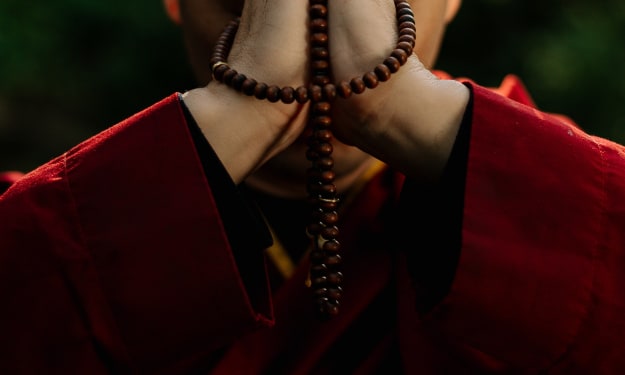
From our earliest years, we’re taught to align ourselves with our parents’ beliefs — those they got from their parents, as well as their overall conditioning.
As we grow up, friends and teachers install other layers of beliefs on top of what we’ve got from our parents. And as we keep moving through our lives, the overall propaganda from the world consolidates everything we’ve accepted as being the ultimate truth to life.
Being mainly surrounded with people that went through the same scenarios as we did, and fearing that we may be rejected by those we love if we don’t act/live like they do — we accept to settle for the life we’ve been sold.
The more time we burn, believing all those things we were told to be the “truth” — the more identified to them we become.
If we believe we were not good enough as our teacher told us, or if we believe that life is a struggle because we’ve watched our parents work their entire lives — those beliefs become the filter through which we interpret life.
As long as life happens according to what we believe in, we feel secure. This is the case for the vast majority of our lives. Until, at some point, some “shocking” events might occur to “wake” us up from our complacency — but we have free will, and unless we choose to give it its due attention — everything goes back to “normal,” including our stagnating existence.
But even if we don’t choose to grow, life is too big to be contained within our little worldviews. And what is our worldview? Everything we believe in. It’s the belief “I am not good enough” coupled with the belief “life is a struggle,” plus all the other beliefs we’ve gathered throughout our lives.
Like a baby, a belief is a creation. When we observe a pattern, and choose to believe in it — we’ve created the pattern. And like any other “creature,” a belief wants to survive. And how does it survive? By narrowing our perception.
Most people don’t realize this simple fact but there’s a enormous difference between how we think, and how things actually are. We interpret events according to our beliefs — to what we want those events to be/mean.
This is how beliefs “feed” and become stronger.
If I believe in “revenge,” as an example, whenever someone says something negative about me, or does something that I dislike — being a believer in revenge, I’ll strike back in one way or another — almost compulsively. First it happens in my mind, with thoughts that nourish my emotion of anger, therefore preparing me to take action.
Our beliefs are unconscious habits. We’ve learned and lived with them for as long as we’ve been alive. Our beliefs represent our psychological foundation, what makes us feel secure.
And for this reason, our beliefs keep narrowing down our perception to the point where everything we perceive from our environment is processed according to their patterns.
We live to reinforce our beliefs. We seek experiences that confirm them. And when life presents us scenarios that contradict our beliefs, we deny them, we react angrily or fearfully; sometimes we’re so much in denial that we don’t even see those scenarios.
To experience this for yourself, and see the danger of living like this, here’s a simple tool you can use the next time you feel compelled to act according to your beliefs.
Most of us watch movies, TV shows and read novels. We love stories and we consume them in endless ways. Those stories are created by human beings like us. And we resonate with them because, collectively, we share similar beliefs. This means that some of us believe in revenge, others in not being good enough, others in life as being a struggle. And so on.
This means that we have some of those patterns within us. If you find comfort in this, then we can say that it’s part of being human. Anyway, coming back to the “tool.”
The next time you feel compelled to react like you’ve always did whenever the conditions are in place; let’s say a close friend talks negatively about you behind your back, or out of nowhere you feel insecure because everyone is applauding your colleague while you’re the one doing all the work — despite the pain, the urge to turn unconscious and the loss of the bigger picture — breathe deeply, and ask yourself this question:
Is there another way to look at this situation?
What this question does is, question, our old ways. It creates a doubt regarding what we believe in. It pushes the mind to see the bigger perspective during a moment of unconsciousness. And it suggests that maybe, there is a different way, one that includes, understands, accepts.
You will still feel the urge to turn unconscious. You will crave to react like you’ve always did. You will feel the fury, the sadness, and everything else.
Remember, beliefs are “creatures” that want to survive, and such events are their “food.”
But asking this question will create an opening in your perception — one that will allow you to see how your beliefs keep you locked in the same patterns for an entire lifetime.
As we keep questioning our ways, we increase our range of perception, and that broader awareness of reality helps us heal, become better human beings and obviously, our blossoming benefits the whole — because we’re one, after all.
About the Creator
Rabih
I write about spirituality, not only to inform but most importantly to transform.






Comments
There are no comments for this story
Be the first to respond and start the conversation.